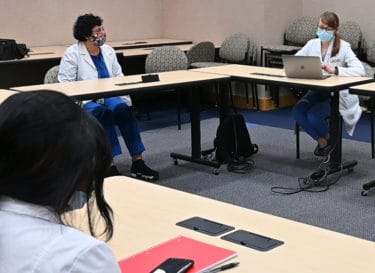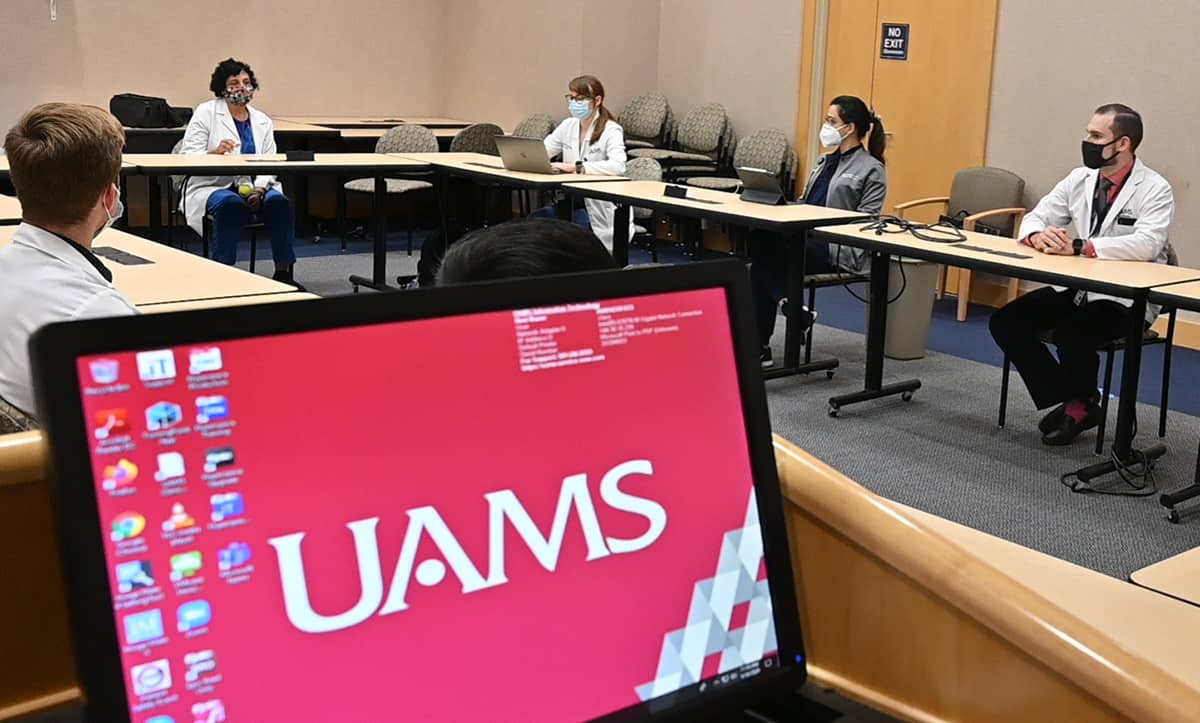‘Geriatric Buddy’ Program Hopes to End Isolation of Older Adults
| UAMS geriatrician Priya Mendiratta, M.D., wants to brighten the lives of older adults who are isolated at home during the COVID-19 pandemic.
She and some students have an idea for how to do that.
“In the nursing home, for the first one or two months of the pandemic when we didn’t go in, I noticed patients were getting depressed,” Mendiratta said. “Now, they look happier to me. We all need human contact and just having a doctor’s visit seemed to help.”
A pilot program called Geriatric Buddy will provide older adults with virtual visits. Starting this fall, residents, fellows and third- and fourth-year students from several UAMS colleges will be able to volunteer to take part.
Mendiratta will lead it with Tobias Vancil, M.D., associate professor in the UAMS College of Medicine Department of Internal Medicine and internal medicine clerkship director. Mendiratta is also director of the geriatric clerkship and course for UAMS medical students, who will be key participants in the program, and a professor at the UAMS Donald W. Reynolds Institute on Aging.

Mendiratta, center, said seniors have been even more isolated from family, friends and the public during the COVID-19 global pandemic.
The students in Geriatric Buddy will use live video chat software like Zoom and Facetime to pair up with older adults, especially those isolated in their homes. They hope to engage the seniors through informal chats that may include board games, puzzles, reading books, exercise and music. If a video chat is not possible, the students would talk with them by phone.
The program received a grant of $1,000 from the Medical Education Foundation of Arkansas to purchase games and other materials. The foundation is sponsored by the Arkansas Medical Society.
Because older adults are at greater risk from COVID-19, to avoid potential exposure, many of the public gyms, senior centers, churches and other social venues have been closed off to them. When they do leave their homes for trips to buy food or get medical care, the risk of exposure also has brought anxiety and stress, Mendiratta said.
“Isolating the elderly might reduce transmission of the virus, but we have to look into strategies to help them stay mentally and physically well. Support systems for them are breaking down,” she said. “The family can’t come in. The isolation gets worse and worse. We all need to reach out to older neighbors in our neighborhoods. We all need to take those small steps.”
The Geriatric Buddy program also may help to identify and address problems individual seniors are experiencing like food scarcity and nutritional deficits.
“Our experience in the past has taught us that social isolation in the elderly puts them at risk for further cognitive decline, worsening of depression and anxiety and other chronic health risks,” Mendiratta said.
Although the primary goal is to lessen the social isolation of older adults and keep interaction fun and engaging, it may offer students an opportunity to practice how to communicate effectively with them and to educate older adults on ways to stay active and healthy during the pandemic.
The program is an alternative to the clinical rotations students participated in as part of their medical education in geriatrics before the pandemic.
“COVID-19 took a big toll on the geriatric course,” Mendiratta said.
Students, residents and fellows used to accompany Mendiratta when she made rounds at a local nursing home, but they can’t now because of the risk of exposure. That has meant fewer opportunities for social interaction even for residents there.
“We are doing glass door visits so the families can see each other in the nursing home,” Mendiratta said. “It’s tough. It’s very moving when you see the older person sitting with their hand on the glass door trying to touch their family. We have to do that, and they can talk through the phone or intercom. Once we let families in without those measures, COVID-19 could get out of control again.”
Mendiratta also is a certified medical director in long-term care medicine and a medical director of a long-term care facility in the Little Rock area.
“We are considering visits with family for some patients, but only outside with full personal protective equipment (PPE), after family members test negative,” Mendiratta said. “I and all long-term care staff are being tested weekly for COVID-19.”
She expects between 50 and 80 students to participate in Geriatric Buddy and for it to continue through the rest of the academic year. Internal medicine, internal medicine-pediatrics and family medicine residents; geriatrics fellows; and other health professions students from pharmacy, physician assistants, and nursing will also benefit from participating in the program.
